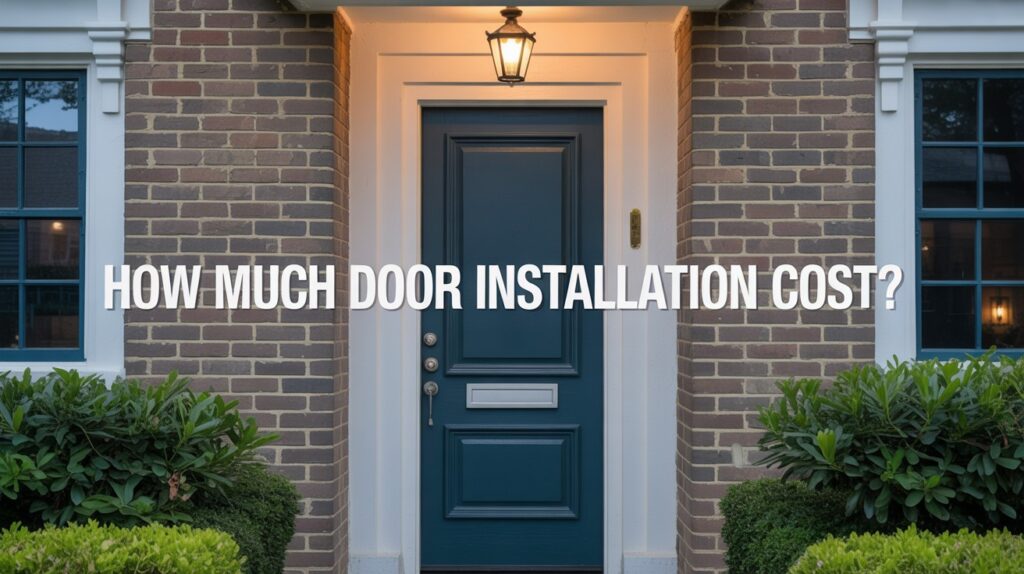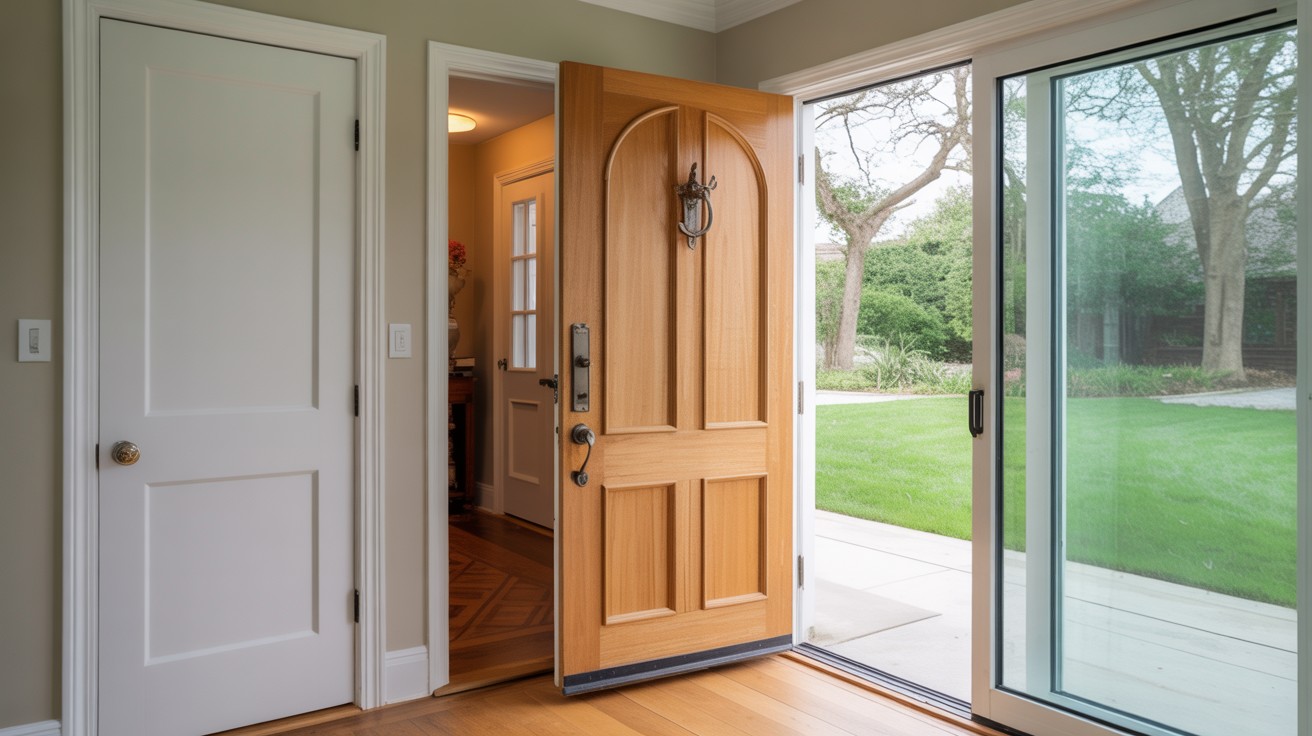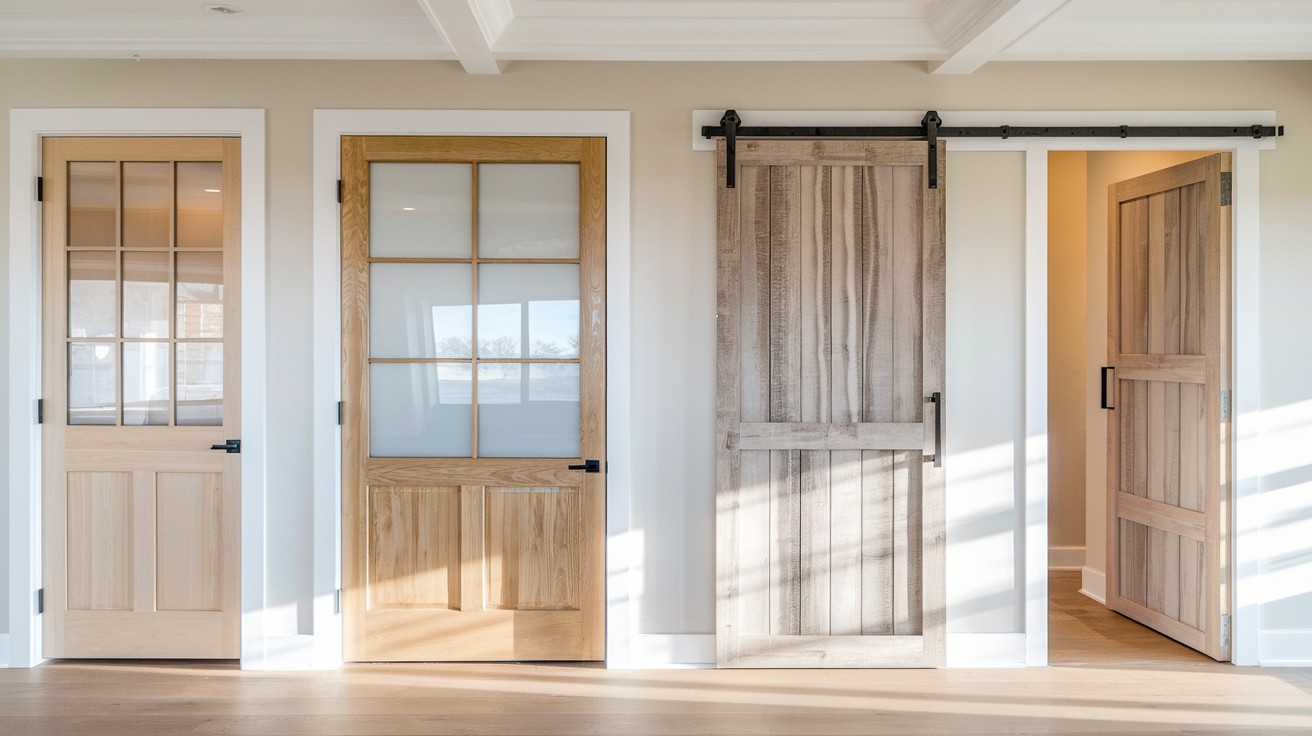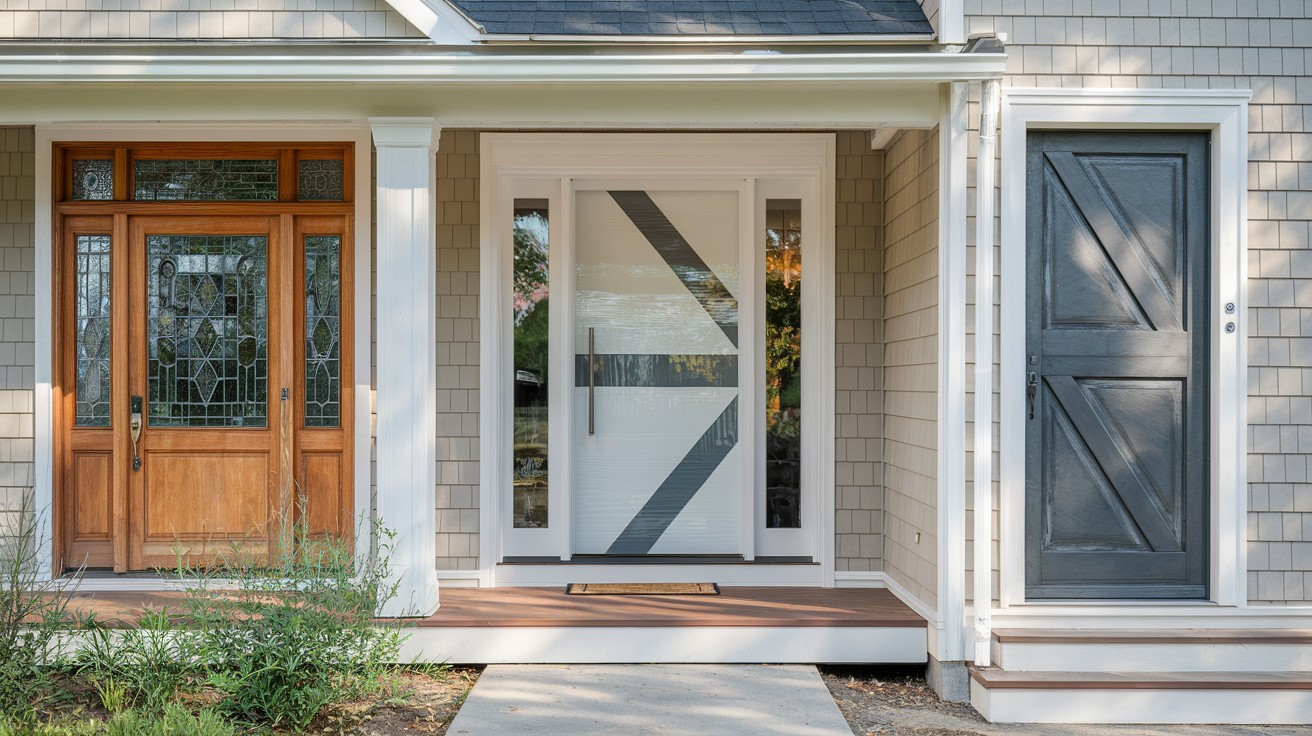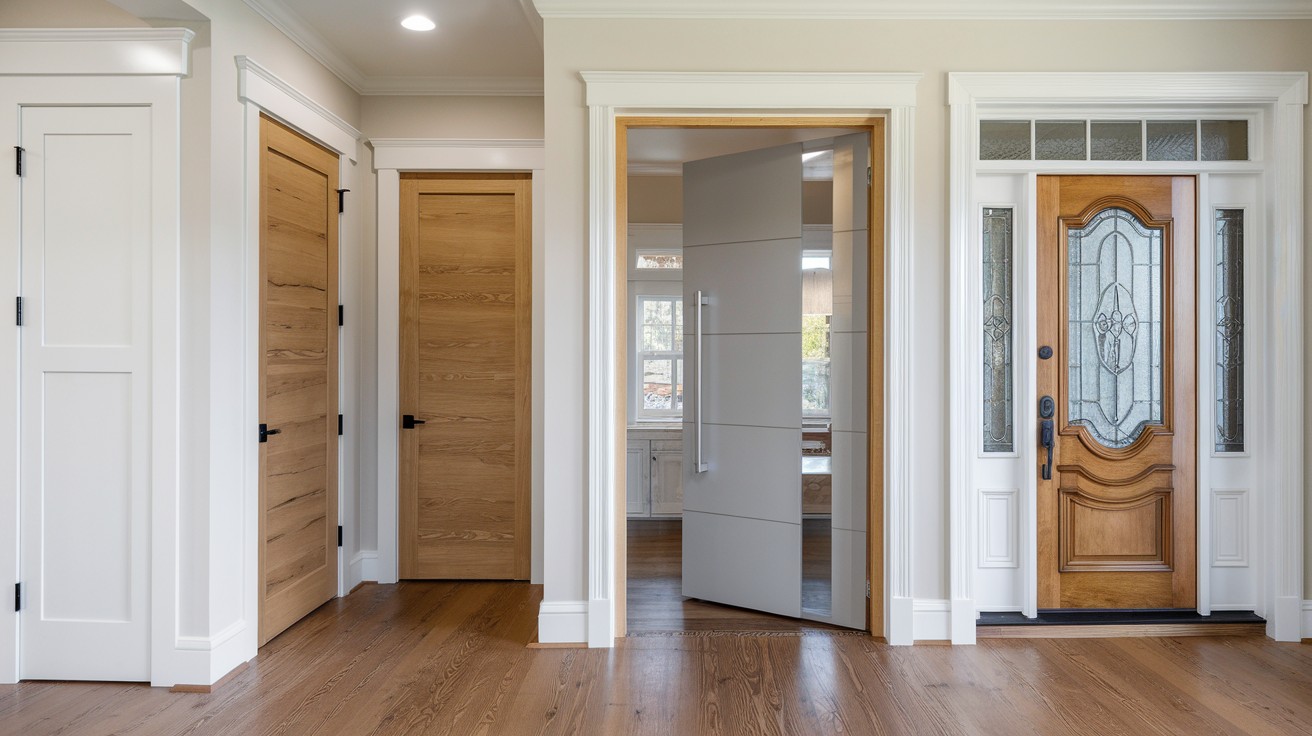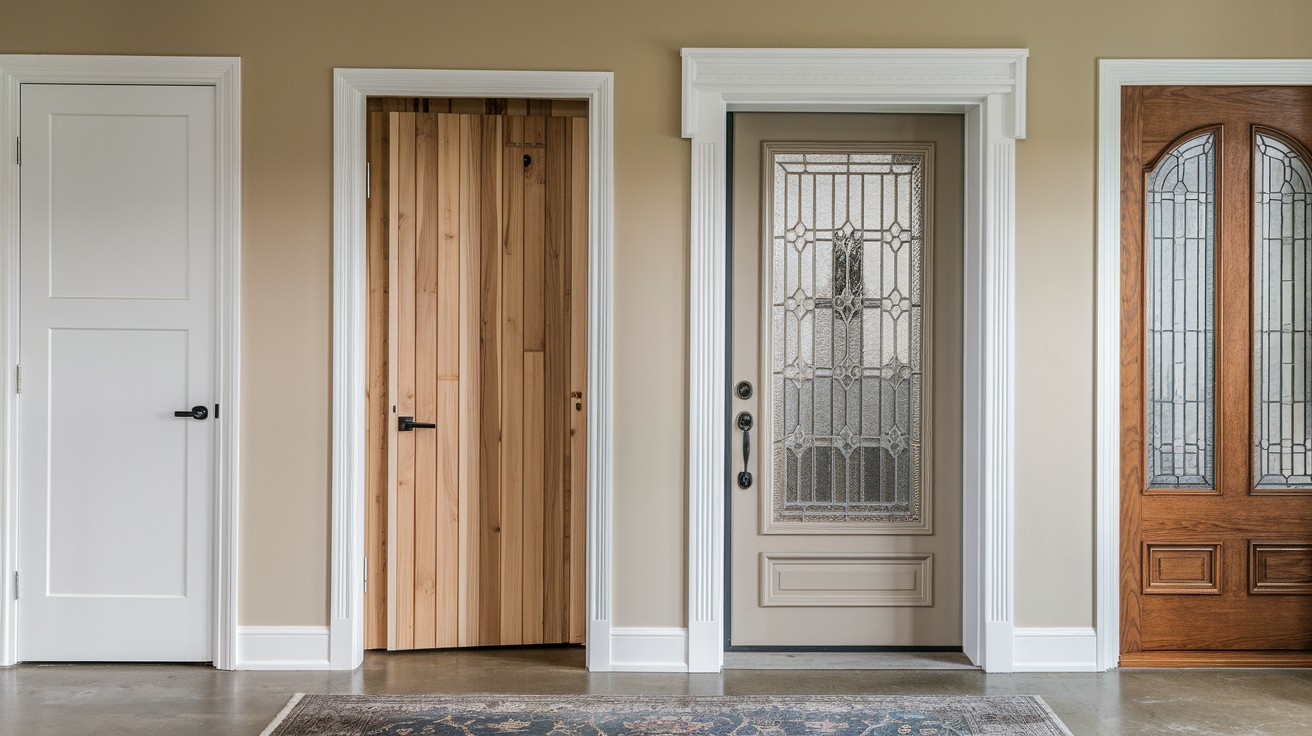Planning a door installation project? Understanding the costs upfront can save you from budget surprises later. Door installation prices vary significantly based on several factors, and knowing what to expect helps you make informed decisions.
Interior doors typically cost less to install than exterior doors. This difference comes from the complexity of the work involved. Interior doors focus mainly on aesthetics and basic functionality. Exterior doors require weatherproofing, security features, and often structural modifications.
Most homeowners underestimate the total project cost by focusing only on door prices. Installation labor, hardware, and additional materials can easily double your initial budget. Professional installation ensures proper fit, function, and longevity of your investment.
In this guide, I’ll break down the real costs you can expect for both interior and exterior door installations. You’ll learn about the key factors that influence pricing.
Why Door Installation Costs Vary
Door installation costs aren’t one-size-fits-all. Several factors determine what you’ll pay for your project.
Door Type and Size: Standard-sized doors cost less than custom dimensions. Common sizes like 32″ or 36″ wide doors have lower installation costs. Custom or oversized doors require special handling and often cost 25-50% more.
Material Used: Hollow-core doors are the cheapest to install. Solid wood doors take more effort due to their weight. Steel and fiberglass doors need special tools and techniques.
Labor Rates and Complexity: Simple replacements cost less than new installations. Adding door frames increases labor time. Complex installations involving electrical work or structural changes cost significantly more.
Regional Pricing Differences: Urban areas typically charge 20-40% more than rural locations. High-cost-of-living areas like California or New York have premium pricing. Local competition also affects rates.
New Installation vs Replacement: Replacing existing doors is usually cheaper. New installations require framing, drywall work, and finishing. The existing door frame condition impacts replacement costs.
Average Interior Door Installation Cost
Interior door installation typically ranges from $150 to $700 per door. This includes both materials and labor for standard installations.
Common Interior Door Types:
- Panel doors: $200-$400 installed
- Flush doors: $150-$300 installed
- Barn doors: $300-$600 installed
- Pocket doors: $400-$700 installed
- French doors: $500-$800 installed
Labor vs Material Breakdown: Labor typically accounts for 40-60% of total cost. A $300 door installation might include $120 for the door and $180 for labor. Hardware and supplies add another $30-50.
Best Use Cases: Panel doors work well for bedrooms and living areas. Flush doors suit closets and utility rooms. Barn doors add style to modern homes. Pocket doors save space in tight areas. French doors create open floor plans between rooms.
Material costs vary by door quality. Basic hollow-core doors start around $40. Solid wood doors range from $100-$300. Hardware adds $25-$75, depending on quality and style.
Average Exterior Door Installation Cost
Exterior door installation costs range from $500 to $1,800 or more. The higher cost reflects additional complexity and materials required.
Common Exterior Door Types:
- Front doors: $800-$1,500 installed
- Sliding glass doors: $1,000-$2,500 installed
- French doors: $1,200-$2,200 installed
- Storm doors: $300-$600 installed
- Security doors: $600-$1,200 installed
Additional Features That Increase Cost: Weatherproofing materials add $50-$100. Insulation upgrades cost $75-$150 extra. Premium hardware increases costs by $100-$300. Smart locks or security features add $200-$500.
Installation Complexities: Exterior installations often require frame reinforcement. Permits may be needed for structural changes. Weatherproofing takes additional time and materials. Proper alignment is critical for security and energy efficiency.
Why They Cost More: Exterior doors need weatherstripping and caulking. Structural integrity requirements are higher. Security features require precise installation. Energy efficiency standards must be met.
Labor Cost Breakdown
Understanding labor costs helps you budget accurately and compare quotes effectively.
Average Hourly Rates: Most contractors charge $50-$100 per hour. Simple installations take 2-4 hours. Complex projects may require 6-8 hours or more.
What’s Usually Included: Basic installation includes hanging the door, installing hardware, and basic adjustments. Frame preparation and minor trimming are typically covered. Clean-up of installation debris is standard.
Additional Charges: Removing old doors costs $25-$75 extra. New framing work adds $100-$300. Painting or staining increases costs by $50-$150. Electrical work for smart features costs $100-$200.
Tips for Comparing Quotes: Get detailed written estimates. Ask what’s included and what costs extra. Check references and licensing. Compare total project cost, not just hourly rates.
Some contractors offer flat-rate pricing instead of hourly charges. This can provide better cost predictability for your project.
DIY vs Pro Installation: Cost Comparison
DIY installation can save money, but it isn’t always the best choice. Understanding the trade-offs helps you decide.
Potential DIY Savings: You can save 40-60% on labor costs. A $400 professional installation might cost $150-$200 in materials only. Simple interior door replacements are most DIY-friendly.
DIY Risks: Improper installation can damage doors or frames. Mistakes may require professional repair. Warranty coverage might be voided. Time investment can be significant.
When DIY Makes Sense: Basic interior door replacements work for handy homeowners. Pre-hung doors in standard sizes are easier. When you have proper tools and patience.
When to Hire Professionals: Exterior doors require weatherproofing expertise. Custom sizes need precise fitting. Structural changes require permits and knowledge. Security doors need proper installation for effectiveness.
Average Cost Difference: DIY interior doors: $80-$200 per door. Professional interior doors: $200-$500 per door. DIY exterior doors: $200-$600 per door. Professional exterior doors: $500-$1,500 per door.
How to Save on Door Installation
Smart shopping and planning can reduce your door installation costs significantly.
- Shop end-of-season sales for better door prices
- Buy doors during home improvement store promotions
- Consider bulk purchases if installing multiple doors
- Reuse existing hardware when it’s in good condition
- Get quotes from local contractors instead of national chains
- Schedule installations during contractors’ slower seasons
- Prepare the work area yourself to reduce labor time
- Compare prices at multiple suppliers before buying
Money-Saving Tips for Door Installation
Additional strategies can help you get the best value for your door installation project.
- Time purchases with spring and fall sales events
- Use local contractors who often offer competitive rates
- Keep existing hinges and handles if they’re quality pieces
- Always get 2-3 quotes before making hiring decisions
- Consider slightly used or returned doors for savings
- Group multiple home improvement projects together
- Ask about discounts for cash payments
- Check if your contractor offers material sourcing discounts
Conclusion
Interior door installation typically costs $150-$700, while exterior doors range from $500-$1,800 or more. Material quality, door type, and installation complexity drive these price differences. Labor usually accounts for 40-60% of total project costs.
Key factors to consider include your local labor rates, door material preferences, and installation complexity. Simple replacements cost less than new installations requiring framing work. Specialty doors and custom sizes command premium prices.
Smart budgeting involves getting multiple quotes, shopping for deals, and timing your project well. Consider DIY for simple interior doors, but hire professionals for exterior installations. Compare total project costs, not just individual components, when making decisions.
Planning and understanding these costs help you make informed choices that fit your budget and needs.
Frequently Asked Questions
How long does door installation typically take?
Interior doors usually take 2-4 hours each. Exterior doors require 4-8 hours, depending on complexity. Multiple doors can often be installed more efficiently in one visit.
Do I need permits for door installation?
Interior door replacements rarely need permits. Exterior doors may require permits if structural changes are involved. Check with your local building department for specific requirements.
Can I install a door myself if I’m not experienced?
Basic interior door replacements are possible for handy homeowners. Exterior doors require more skill and tools. Consider your comfort level with measuring, cutting, and hardware installation.
What’s the difference between pre-hung and slab doors?
Pre-hung doors come with frames attached, making installation easier but more expensive. Slab doors are just the door itself, requiring existing frames and more installation work.
When should I replace door frames along with doors?
Replace frames when they’re damaged, warped, or the wrong size. New construction or major renovations often require new frames. Existing frames in good condition can usually be reused.

